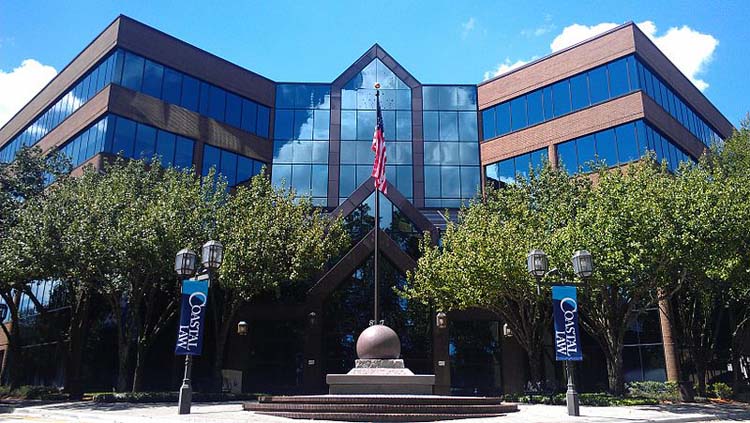Florida Coastal loses TRO motion after Legal Ed Section stays some remedial actions

Florida Coastal School of Law/Wikimedia Commons.
A federal judge has denied Florida Coastal School of Law”s motion seeking to prohibit an American Bar Association accreditation requirement that the school post public notice on its website about being out of compliance with various standards.
U.S. District Judge Brian J. Davis of the Middle District of Florida found that because the for-profit InfiLaw school still has an internal appeal pending with the council of the ABA’s Section of Legal Education and Admissions to the Bar, judicial review of the matter is not yet appropriate. The court also found that the law school has not shown irreparable harm from the notice requirement.
The July 9 order denied Florida Coastal’s motion for temporary restraining order and preliminary injunction. Also, it states that the council of the ABA’s Section of Legal Education and Admissions to the Bar has stayed requirements that the law school advise students in writing about attrition rates and bar passage rates and the student’s rank by class quartile.
Additionally, a requirement that an appointed fact-finder access the law school’s financial information was stayed by the council, the order states. According to a footnote in the order, Florida Coastal took issue with the fact finder being tasked with reviewing its student loan default rates, and the school’s “financial condition.” Scott DeVito, Florida Coastal’s dean, in an email wrote that the decision was made by the council chair in a “special meeting” before the motion hearing.
“Coastal’s argument that the public notice of the ABA’s decision will turn away the best-qualified students is pure speculation, especially where a prospective student astute enough to find the disclosure will also have access to all of the data Coastal argues should substantiate an ABA determination that Coastal is in compliance with all the standards,” Davis wrote in his order.
Davis also noted that while the reputation argument made by the law school “is not without merit, because it includes analytic conclusions” regarding compliance with ABA standards, the information in question has been public for almost two months.
An Oct. 12 letter posted by the section stated that Florida Coastal’s accreditation committee found the school to be out of compliance with:
Standard 301(a), which states that law schools must have a rigorous program to prepare students to pass a bar exam and practice law.
Standard 309(b), which addresses academic support to give students a “reasonable opportunity” to complete their studies and become lawyers.
Standard 501, sections (a) and (b). The first part directs that accredited law schools have sound admissions policies, while the second part mandates that people who don’t appear capable of graduating from law school or passing a bar exam should not be admitted as students.
Interpretation 501-1, which discusses factors to consider in admissions.
After a March hearing, the section’s accreditation committee found that the law school had come into compliance with Standard 501(a). For the other standards, the committee directed the law school to develop a reliable plan, including admissions data and methodology, and said that a fact-finder would be appointed.
Florida Coastal and InfiLaw’s two other schools, Arizona Summit School of Law and the now-closed Charlotte School of Law, all filed federal due process lawsuits against the ABA in May, involving accreditation findings that the schools were out of compliance with admissions and programming standards. Out of the three, Florida Coastal is the only school that has not been placed on probation by the ABA.
The bar passage rate for Florida Coastal was 47.7 percent July 2017, according to data from the Florida Board of Bar examiners, and 62.1 percent for February 2018.
“The February bar result, while promising, does not necessarily mean Coastal will sustain a break from its pattern of poor performance on the bar. All this information was considered by the ABA in its decision,” the order states. In a footnote, Davis wrote that it “is unclear what role, if any, Coastal’s program to pay certain students to defer taking the Bar has on its passage rates or the ABA decision.”
The order also notes that the law school has raised its 25th percentile LSAT score from 141 to 147 between 2016 and 2018. Also, the school has “encountered troubling attrition rates,” according to the order. Florida Coastal had a total of 383 students, and 92 left through nonacademic attrition, according to the law school’s Standard 509 Information Report for 2017. Full-time tuition at the law school for the 2017 school year was $43,558, according to its website.



